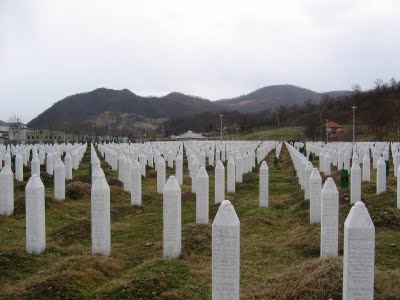Difference between revisions of "Bosnia and Herzegovina"
| (One intermediate revision by the same user not shown) | |||
| Line 1: | Line 1: | ||
=== 1992 - 1995 === | === 1992 - 1995 === | ||
[[File:Thebosnia.jpg|400px|thumbnail|left]] | [[File:Thebosnia.jpg|400px|thumbnail|left]] | ||
| − | The Bosnian conflict has been criticised by many analysts and human rights organisations. One of the greatest atrocities was made in the town of Srebrenica, where over 7,000 Muslim men and boys along with 25,000-30,000 refugees were ruthlessly killed, despite the fact the area was officially listed as a “safe haven” by the United Nations. Although it was occupied by 400 Dutch peacekeepers, the town was seized and the peacekeepers watched helplessly as thousands of innocents lost their lives. The international community was critical of the United Nations for failing to deal with the incident efficiently, and in a report created in 1999, UN Secretary General [[Annan, Kofi|Kofi Annan]] said the world as a whole should accept responsibility rather than any one party being singled out individually. The Srebrenica massacre is, to this day, seen as one of the greatest failures of the United Nations, and has been ruled to be genocide by the International Criminal Tribunal for the Former Yugoslavia (ICTY). | + | The Bosnian conflict has been criticised by many analysts and [[Human Rights|human rights]] organisations. One of the greatest atrocities was made in the town of Srebrenica, where over 7,000 Muslim men and boys along with 25,000-30,000 refugees were ruthlessly killed, despite the fact the area was officially listed as a “safe haven” by the United Nations. Although it was occupied by 400 Dutch peacekeepers, the town was seized and the peacekeepers watched helplessly as thousands of innocents lost their lives. The international community was critical of the United Nations for failing to deal with the incident efficiently, and in a report created in 1999, UN Secretary General [[Annan, Kofi|Kofi Annan]] said the world as a whole should accept responsibility rather than any one party being singled out individually. The Srebrenica massacre is, to this day, seen as one of the greatest failures of the United Nations, and has been ruled to be [[genocide]] by the International Criminal Tribunal for the Former Yugoslavia (ICTY). |
[[Category:Acts of Genocide since World War II]] | [[Category:Acts of Genocide since World War II]] | ||
Latest revision as of 07:50, 1 April 2014
1992 - 1995[edit]
The Bosnian conflict has been criticised by many analysts and human rights organisations. One of the greatest atrocities was made in the town of Srebrenica, where over 7,000 Muslim men and boys along with 25,000-30,000 refugees were ruthlessly killed, despite the fact the area was officially listed as a “safe haven” by the United Nations. Although it was occupied by 400 Dutch peacekeepers, the town was seized and the peacekeepers watched helplessly as thousands of innocents lost their lives. The international community was critical of the United Nations for failing to deal with the incident efficiently, and in a report created in 1999, UN Secretary General Kofi Annan said the world as a whole should accept responsibility rather than any one party being singled out individually. The Srebrenica massacre is, to this day, seen as one of the greatest failures of the United Nations, and has been ruled to be genocide by the International Criminal Tribunal for the Former Yugoslavia (ICTY).
